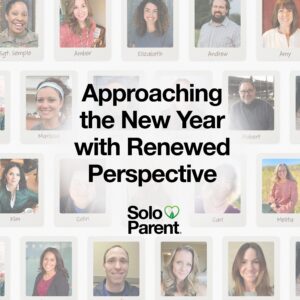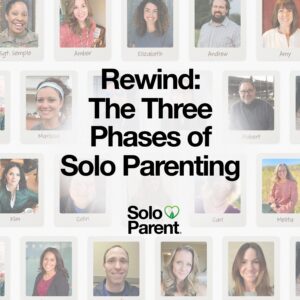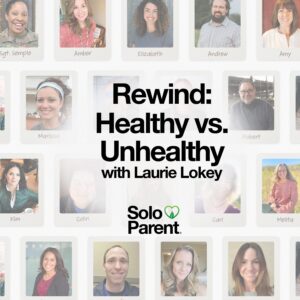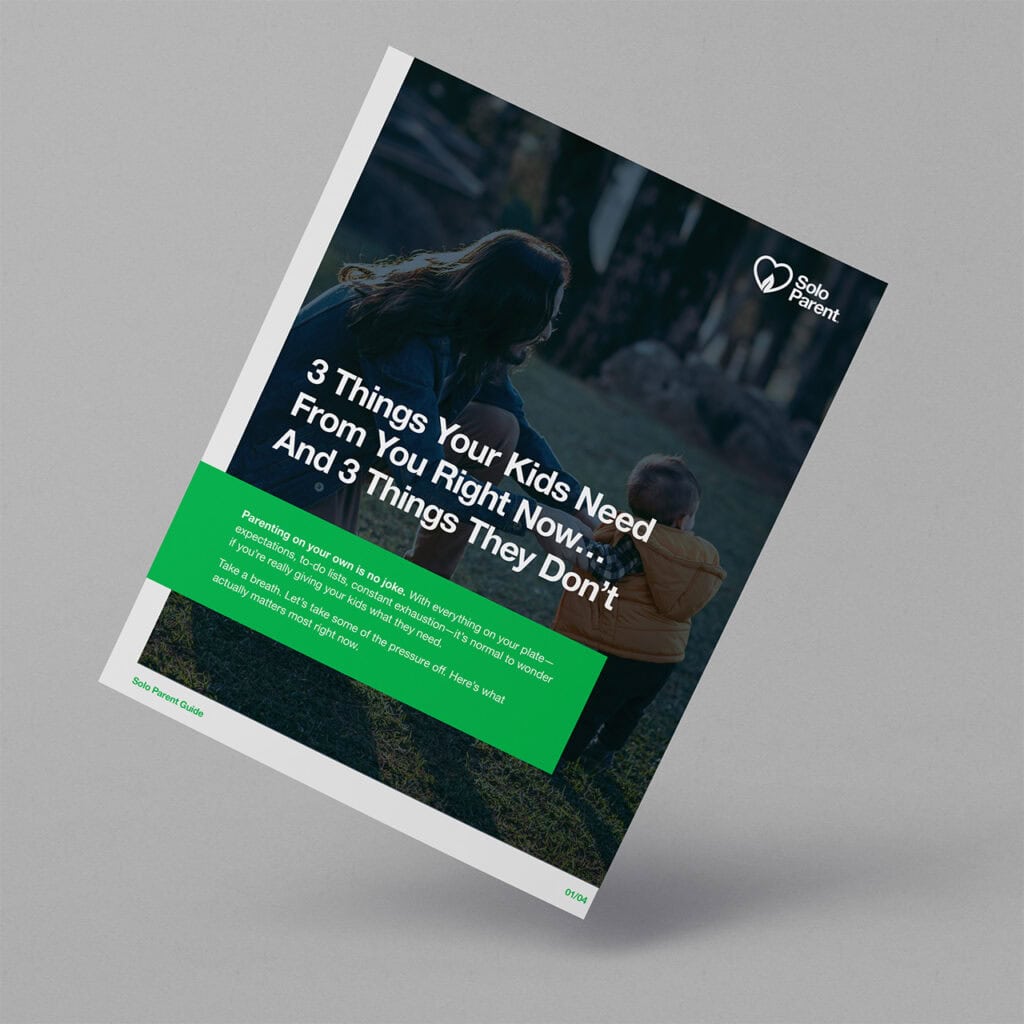In your life, in your life, how has codependency gotten in the way of healthy love? We’re going to talk about that today. Welcome to the Solo Parent Podcast. My name is Robert Beeson.
And I”m Elizabeth Cole.This month we are playing clips from our favorite episodes of 2024, and today we’re talking about Is it Love or Is It Codependency?
If we’re honest, we have to admit that we often don’t know what healthy love looks like. Codependency can often feel like love. So how can we tell the difference?
What I (Elizabeth) really love about this episode is how we dug into the struggles and how it makes sense, why we’ve done what we’ve done and how we’ve gotten to where we are today—and that there’s hope that we can unravel that.
[BEGIN CLIP] What does codependency look like?
(Amber Fuller) Maybe we really are all veterans on this topic in this room. I know I am, but when I think about “Why does codependency feel like love to me?” It’s because old habits die hard and the patterns I learned in my family continue to manifest in adulthood. I loved in the ways that I learned to love. Kudos to my parents for all the wonderful recovery work they did as former alcoholics who became sober and found God, but they were in the process of growing in health as I was being raised. There were still tendencies to try to manage or control other people’s behavior by people pleasing, by walking on eggshells, by tiptoeing around things. God bless my dad—he would encourage me all the time to be a caretaker. “Hey, is your sister okay?” I didn’t know that the right response to that was, “I don’t know, dad, why don’t you go ask her?” But I knew in my mind that question was my assignment. Find out if my sister was okay and maybe if she wasn’t, do something to help her be okay. And so old habits die hard. The patterns we learn can get so ingrained. Even to this day, I’ll wonder if my sister’s okay, and I might even find myself leaning into those familiar ways.
About a year ago, my dad called me (Elizabeth) out of the blue only to ask me to call my mom. He said, “Hey, can you call your mom and cheer her up? Make her in a better mood? She’s feeling really down today.” And I said, “Sorry. I don’t think that’s my job.”
I (Robert) have struggled with codependency all my life. I’ve realized that from my backstory, growing up as a missionary family, we were always there to serve. I always viewed myself and my connection with others as how I made them feel. I realized I did that in my romantic relationships, my friendships, and all that. My codependency became most glaring to me with my kids. As single parents, we jump through every single freaking hoop to make sure they don’t experience more pain than they’ve already experienced. An emotional entitlement develops in them where someone else is responsible for making them feel better. And that’s where I had to really start coming to terms with. It took a long time, and I still deal with it. If one of my girls is having a hard time, it’s hard for me to draw a boundary and go, “I’m so sorry to hear that” but not stepping in and fixing it and taking away the discomfort.
I (Elizabeth) did the same thing and still, at times, I don’t allow people to suffer the consequences of their actions. I’ll step in and either be a safety net and cushion the blow or step in and fix it ahead of time. I can see what’s coming down the pike and I’ll step in and be like, “Hey, I just want you to know…” I did this a couple of weeks ago. I called my ex and told him about something that was coming his way and I was like, “You need to be aware that this might be happening soon, and I just want you to just be prepared.” My counselor called me out and was like, “You do not let that man suffer the consequences, even now when you’re divorced. There are things that need to happen in the protection of your child.” It’s my codependency flaring up. And, it’s because I don’t want the conflict. I don’t want to have an enemy. I don’t want Jax to see his dad and I hating each other and for him to feel like he’s caught in the middle.
Old habits die really hard, and it’s what keeps a lot of single parents in codependent and unhealthy relationships for so long. I’m not saying relationships with our kids—we’re meant to be there all the time. But we can get really stuck in this codependency cycle.
When you come out of a marriage like mine, we lose our value in our relationships. And when you’ve lost your value and lost yourself and you’ve lived in this codependent state for so long, you put your needs on the back burner. You forget who you are. I know for my ex and I, we were so intermingled together and he became so much part of who I was (and vice versa), I didn’t necessarily have my own identity. I didn’t have my own hobbies. A big piece of this, especially if you know you’re coming out of a codependent relationship, it’s important to take a step back and figure out who you are so that you can move forward in a healthy way. But changing yourself and losing yourself is such a big piece of codependency.
What does healthy connection look like?
God wanted relationship with us, and he designed us for connection. And so we know part of being human is to long for connection. The problem starts when we begin to do too much to maintain connection, or when we avoid certain behaviors because it might cause us to be abandoned. And so instead of healthy connection, we find counterfeit connection, codependent connection. A good way to think about healthy connection is as a balanced interplay of give and take. I know where I start and stop. I know where you start and stop. Instead of trying to get over into your lane and manage all of your emotions, your feelings, your behaviors, I stay within myself grounded, secure, able to manage my own being in life without having to try to do that for someone else. It’s a mutual dependence where there’s give and take and there’s a balance of caring for self and caring for others and not giving away too much of yourself for the benefit of someone else.
It’s not about running from that relationship necessarily. It’s actually being present in it, but realizing you can be present with empathy and compassion and not feel the burden of, “I’ve got to make you feel better. Or it’s my job to fix you.” And I think that’s one of the things that I (Robert) love about our groups is that we talk about “no crosstalk” because it’s a natural tendency if someone brings up something they’re struggling with, to jump in and try and fix it. It’s uncomfortable to sit with someone in discomfort, but that is a sign of a healthy connection—if you can really be present and really listen without feeling like you need to fix it.[END CLIP]
I (Robert) think sometimes, we try to counteract the way we were raised. Instead, we foster a new sense of codependency. As I’m thinking about the way I was raised, I was raised with my parents at first, and then at a boarding school. I feel like I raised myself in a lot of ways. I was determined that I was going to be more present and more available to my girls. And so I went counter to the way I was raised. As a result, I totally overcompensated with my kids and became very, very codependent, especially after the divorce, when I just wanted to protect them from everything.
I (Elizabeth) have a hard time remembering my childhood, But I very much remember my marriage. And I can very vividly and clearly see how those patterns and habits and all of the things played out. And my ex was definitely the type that if he was in a bad mood, then everybody had to be in a bad mood.
One way I’ve handled it is picturing a brick wall between me and the person. Then it’s like, “You can’t touch me behind my brick wall, so you spew your stuff all this way, but it’s not going to hurt me.” And if I’m in a spot where they actually could hurt me, I just put up my brick wall and say, I’m not gonna let it happen.
I (Robert) think that I try to manage my friends’ experiences more than I do my spouse’s. I have a healthier boundary life with my spouse. I’ve learned some codependency tactics, and I can just kind of say, Nope. Not going there. But if it’s just a friend, it is harder for me to put up a boundary. And it’s still hard with my kids. But with my friends, it’s just really hard. I don’t want to be a jerk. But it’s important to have boundaries with them not try to manage their feelings or their experience of me.
I (Elizabeth) am more codependent with my significant other than I am with my friends. And the reason why is because just this past week, I’ve gotten feedback from friends that I’m brutally honest and that they appreciate that about me. And I don’t know that there’s room for codependency if there’s brutal honesty in a loving way.
And the thing is, I feel so safe in those relationships. I don’t have any fear of losing them as friends. So I can show up fully as myself; but in a romantic relationship, there’s still something there that’s like, I have something to lose. I’m working on it.
It makes me (Robert) wonder, if we should just run things through that codependency lens: Am I adjusting my behavior or not being my true self because I feel like I have something to lose?
I (Elizabeth) think there’s something to that because I do think that one of the antidotes is being willing to let something go. I might say something that offends you, but I’m going to be honest. I’m not trying to offend you, but I’m taking a risk that you might say, “I’m out. I’m not going to be your friend anymore.” It’s a healthy thing to be able to accept that.
I (Robert) will say, there are friends that I have decidedly walked away from this year. And it’s not that I don’t care, it’s just that I don’t have bandwidth. It’s really helped me get past some codependency this year, just saying, “I have to let it go. I can’t hold on to everything”
The brutally honest piece, this is not permission to be mean and hateful. This is all about coming from a place of love and being able to show up as yourself, but also to speak the truth in love with your friends. And to your point, Robert, if they leave, that’s not the kind of friend I want anyway. That’s not where I want to spend my time. I don’t want to walk on eggshells. I want to be able to keep investing. There has to be this healthy, give and take.
And if that friend who I was brutally honest with chooses not to take my advice, I feel like in my codependency, I would have been upset or mad that she didn’t hear me out or listen to me or take it to heart. And now I’m like, “All right, I can separate myself. it’s her life to live.”
Listener Question
Where can I find a good single man as a single mom?
(Robert) Well, you can telll that’s a legitimate question. I’m stumped.Do you have an answer for this?
I (Elizabeth) was actually talking about this to some friends this past weekend, And I have a friend who’s single, and we were telling her, because she’s done all the apps, all of ’em, and she said that she was going to maybe do eHarmony, go ahead and start paying for that or match.com or something. But we were telling her, you need to go on speed dates or go join groups or go do find a singles group or find something that you enjoy doing and just go be a part of things in the community, because clearly this dating app thing is not working.
I (Robert) did join eHarmony and that is where I met my wife. And I know a lot of other people that have also had success there, and I know a lot of other people that hated it and didn’t. So I don’t think that there’s a one-size-fits-all answer. But, first, make sure that you’re in a place to actually start looking. And then second, don’t be afraid to put yourself out there; whether it’s a dating app or whether it’s groups. There’s not a science to it. It’s a matter of just honestly praying and asking God to bring the right person. I know that sounds really trite, but I believe it with all my heart.
And we talked earlier this month about making peace with singleness. What does that look like? When’s it even time to get out there? Am I doing it for the right reasons? I (Elizabeth) sure wasn’t—in the beginning anyway.
If you want to send in a question, go to our website and you’ll find directions on how to email, call, or leave a voice message. You can also message us on Instagram or Facebook. You’ll find us at Solo Parent Society on either one of those platforms.




